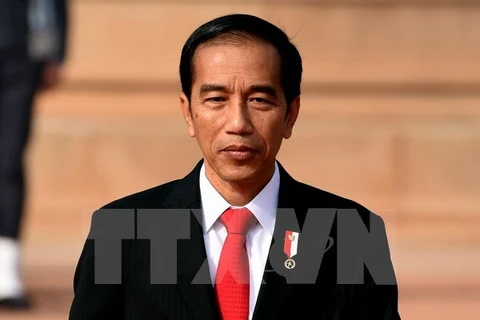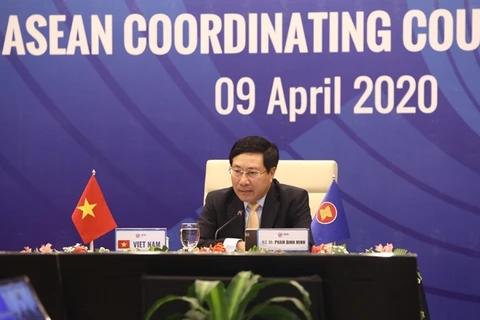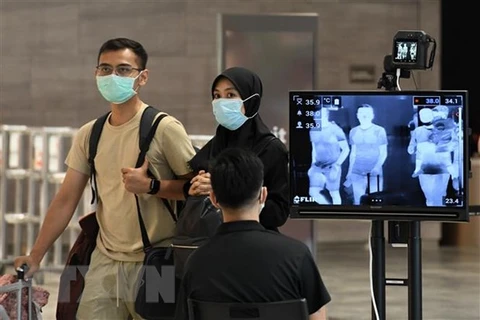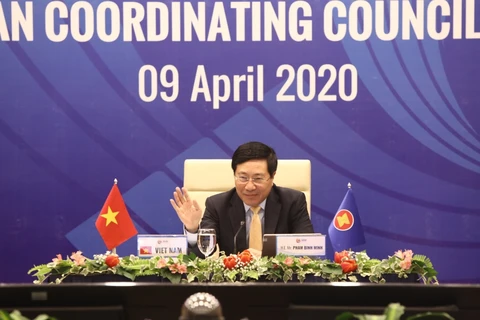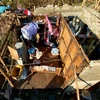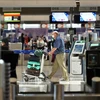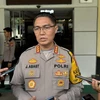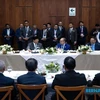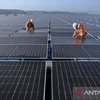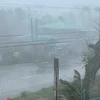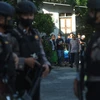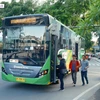Hanoi (VNA) - Leaders of the ASEAN nations and the partner countries of China, Japan and the Republic of Korea (ASEAN+3) will discuss measures and initiatives during online special summits on April 14 aimed at further enhancing cooperation in the COVID-19 fight and ensuring that the region’s dynamic and sustainable development continues in the long term.
COVID-19 has spread to all the 10 ASEAN member countries, which had recorded more than 19,200 cases of infection and nearly 800 deaths as at the night of April 12.
Aside from taking its toll on people’s health and lives, the pandemic has also affected regional economies, in particular service sectors which account for 30 percent of ASEAN’s GDP. It has disrupted regional and global supply chains, exposed a large number of people to the risk of job losses, and posed challenges in social security.
Many ASEAN events, including the ASEAN-US Special Summit and the 36th ASEAN Summit, have been postponed due to the COVID-19 outbreak.
Vietnam, as the ASEAN Chair in 2020, has been proactively working to promote the bloc’s solidarity and shared effort against the coronavirus.
In an article entitled “ASEAN’s cooperation to combat COVID-19”, Deputy Prime Minister and Foreign Minister Pham Binh Minh wrote: “Vietnam, as the ASEAN Chair, and other ASEAN member states have identified the theme of ‘Cohesive and Responsive ASEAN’ for 2020, with the aim of kicking into high gear ASEAN Community building and promoting ASEAN’s role in a world filled with uncertainties. The sudden outbreak of the SARS-CoV-2 virus and the unprecedented consequences and turbulence that have followed testify to the relevance of this theme and course of action.”
After consulting with other ASEAN leaders, Prime Minister Nguyen Xuan Phuc issued an ASEAN Chairman’s Statement on the ASEAN Collective Response to the Outbreak of COVID-19 on February 14, affirming the bloc’s resolve and political commitment to controlling the disease.
The ASEAN Coordinating Council (ACC), comprising foreign ministers of member states, held two meetings on February 20 and April 9 chaired by Deputy PM and Foreign Minister Minh to discuss measures to boost cooperation within ASEAN and between ASEAN and its partners in response to the pandemic.
Meanwhile, emergency response mechanisms for epidemics in ASEAN and ASEAN+3 countries were activated shortly after COVID-19 first broke out. ASEAN and Chinese foreign ministers issued a statement on the coronavirus on February 20. One day prior, ASEAN defense ministers adopted a joint statement on defense cooperation in response to the outbreak. The bloc’s economic ministers, meanwhile, released a joint statement on March 10 on strengthening ASEAN’s economic resilience to cope with the COVID-19 pandemic.
To prepare for the ASEAN and ASEAN+3 special summits, the online ACC meeting on April 9 devised several recommendations that focus on containing the spread of the disease, supporting ASEAN citizens affected by the pandemic in member nations and non-ASEAN countries, and mitigating the outbreak’s socio-economic impact. These recommendations will be submitted to leaders at the upcoming summits.
Additionally, Vietnam recently chaired the first meeting of the ACC Working Group on Public Health Emergencies while actively working to help foster the bloc’s cooperation with China, the US, and the EU.
The online ASEAN and ASEAN+3 special summits in response to COVID-19 are considered necessary, via which the bloc and its partners will express their strong commitment and resolve to preventing and eradicating the risks the pandemic poses to people’s lives and socio-economic stability in the region./.
COVID-19 has spread to all the 10 ASEAN member countries, which had recorded more than 19,200 cases of infection and nearly 800 deaths as at the night of April 12.
Aside from taking its toll on people’s health and lives, the pandemic has also affected regional economies, in particular service sectors which account for 30 percent of ASEAN’s GDP. It has disrupted regional and global supply chains, exposed a large number of people to the risk of job losses, and posed challenges in social security.
Many ASEAN events, including the ASEAN-US Special Summit and the 36th ASEAN Summit, have been postponed due to the COVID-19 outbreak.
Vietnam, as the ASEAN Chair in 2020, has been proactively working to promote the bloc’s solidarity and shared effort against the coronavirus.
In an article entitled “ASEAN’s cooperation to combat COVID-19”, Deputy Prime Minister and Foreign Minister Pham Binh Minh wrote: “Vietnam, as the ASEAN Chair, and other ASEAN member states have identified the theme of ‘Cohesive and Responsive ASEAN’ for 2020, with the aim of kicking into high gear ASEAN Community building and promoting ASEAN’s role in a world filled with uncertainties. The sudden outbreak of the SARS-CoV-2 virus and the unprecedented consequences and turbulence that have followed testify to the relevance of this theme and course of action.”
After consulting with other ASEAN leaders, Prime Minister Nguyen Xuan Phuc issued an ASEAN Chairman’s Statement on the ASEAN Collective Response to the Outbreak of COVID-19 on February 14, affirming the bloc’s resolve and political commitment to controlling the disease.
The ASEAN Coordinating Council (ACC), comprising foreign ministers of member states, held two meetings on February 20 and April 9 chaired by Deputy PM and Foreign Minister Minh to discuss measures to boost cooperation within ASEAN and between ASEAN and its partners in response to the pandemic.
Meanwhile, emergency response mechanisms for epidemics in ASEAN and ASEAN+3 countries were activated shortly after COVID-19 first broke out. ASEAN and Chinese foreign ministers issued a statement on the coronavirus on February 20. One day prior, ASEAN defense ministers adopted a joint statement on defense cooperation in response to the outbreak. The bloc’s economic ministers, meanwhile, released a joint statement on March 10 on strengthening ASEAN’s economic resilience to cope with the COVID-19 pandemic.
To prepare for the ASEAN and ASEAN+3 special summits, the online ACC meeting on April 9 devised several recommendations that focus on containing the spread of the disease, supporting ASEAN citizens affected by the pandemic in member nations and non-ASEAN countries, and mitigating the outbreak’s socio-economic impact. These recommendations will be submitted to leaders at the upcoming summits.
Additionally, Vietnam recently chaired the first meeting of the ACC Working Group on Public Health Emergencies while actively working to help foster the bloc’s cooperation with China, the US, and the EU.
The online ASEAN and ASEAN+3 special summits in response to COVID-19 are considered necessary, via which the bloc and its partners will express their strong commitment and resolve to preventing and eradicating the risks the pandemic poses to people’s lives and socio-economic stability in the region./.
VNA

